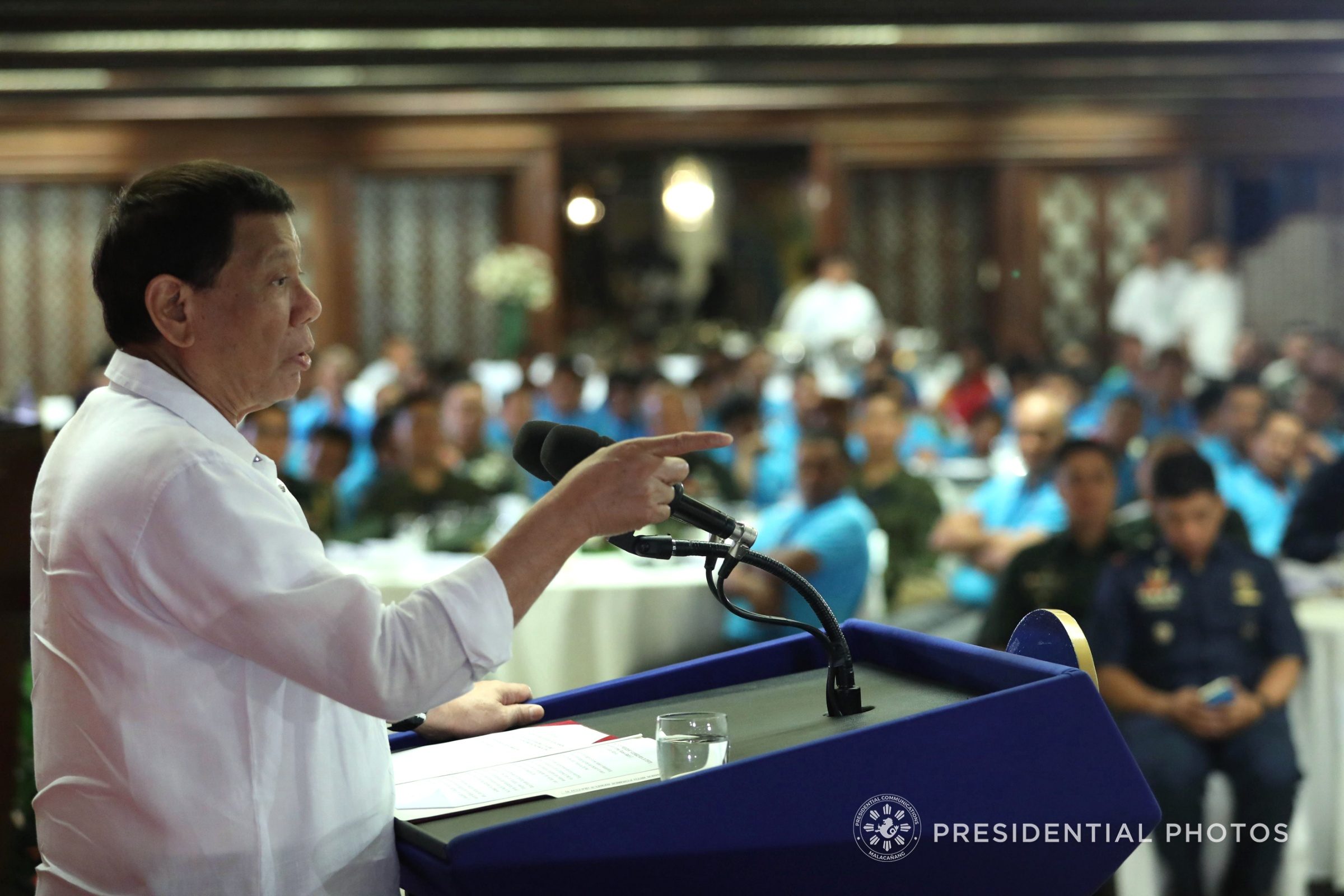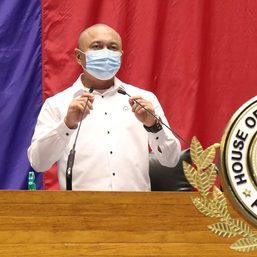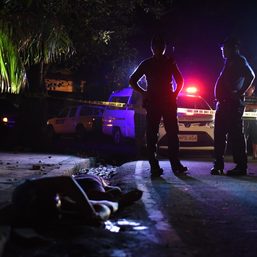SUMMARY
This is AI generated summarization, which may have errors. For context, always refer to the full article.

MANILA, Philippines (UPDATED) – President Rodrigo Duterte announced on Wednesday, March 14, that the Philippines will withdraw from the International Criminal Court (ICC) “effective immediately.”
In a rare written statement released to media on Wednesday, Duterte said the Philippines will withdraw its ratification of the Rome Statute, the treaty which created the ICC.
“I therefore declare and forthwith give notice, as President of the Republic of the Philippines, that the Philippines is withdrawing its ratification of the Rome Statute effective immediately,” he said. (FULL TEXT: Duterte’s statement on Int’l Criminal Court withdrawal)
According to the Rome Statute however, a state party’s withdrawal from the ICC can only take effect a year after the written notification of the withdrawal is received by the United Nations secretary-general.
Duterte disputed this, saying the withdrawal should take effect immediately, as he claimed that the agreement was fraudulent to begin with.
The one-year timeline, he said, is “not applicable insofar as the effectivity of the withdrawal of the Philippines as a signatory to the Rome Statute is concerned, for the reason that there appears to be fraud in entering such agreement.” (READ: Things to know about Duterte’s pet peeve ICC)
Explaining his view, Duterte said the Philippines was “made to believe that the principle of complementarity shall be observed, that the principle of due process and the presumption of innocence as mandated by our Constitution and the Rome Statute shall prevail, and that the legal requirement of publication to make the Rome Statute enforceable shall be maintained.” ([OPINION] ICC: Complementarity, not exhaustion of remedies)
Duterte made the declaration over a month after the ICC started its “preliminary examination” of the complaint filed against the Philippine leader in connection with the high number of killings under his violent war on drugs. (READ: What challenges will complaint vs Duterte face before ICC?)
Duterte’s intent to withdraw from the ICC also comes after Malacañang said he initially welcomed the court’s examination of the drug war.
“The President welcomes the preliminary examination because he is sick and tired of being accused of the commission of crimes against humanity,” Presidential Spokesperson Harry Roque said in early February. (READ: Roque once thanked Aquino for PH membership in Int’l Criminal Court)
No publication
In his statement, Duterte again insisted that the ICC does not have jurisdiction over him. He outlined his arguments for making the claim.
He alleged that the Rome Statute was never published in the Official Gazette – the official journal of the Republic of the Philippines – thus it was never effective in the country.
“Under our law, particularly the New Civil Code, a law shall become effective only upon its publication in the Official Gazette or in a newspaper of general circulation. Devoid of the legal required publication, the Rome Statute is ineffective and unenforceable,” the President wrote.
He was likely referring to Article 2 of the Civil Code which states: “Laws shall take effect after 15 days following the completion of their publication either in the Official Gazette or in a newspaper of general circulation in the Philippines, unless it is otherwise provided.”
In August 2011, a press release about the concurrence of the Senate on the Rome Statute was published on the Official Gazette, which only carries Philippines laws and executive issuances.
Duterte said that because of the supposed non-publication of the Rome Statute on the Official Gazette or a Philippine newspaper, “an international law cannot supplant, prevail, or diminish a domestic law.”
The Chief Executive invoked presidential immunity as yet another reason why the ICC has no jurisdiction over him.
A sitting president’s immunity from suit is not stated explicitly in the 1987 Constitution but Duterte contends that charter framers “unanimously agree that such doctrine is deemed written in the 1987 Constitution.”
“Thus, considering that such immunity is part and parcel of the organic law of the Philippines, it cannot be removed through the enactment of a statute or be bargained away through the negotiation of a treaty,” said Duterte.
The Philippine leader also argued that the acts he is being accused of committing are not acts under the jurisdiction of the ICC.
The police implementing his drug war, he said, were part of legitimate government operations that “lacked the intent to kill.” If there were deaths of suspects, it was because police were merely defending themselves, he said. (READ: CHR: Withdrawal from Int’l Criminal Court can be seen as ‘encouraging impunity’)
Politicized ICC, UN?
Duterte also accused the ICC and the United Nations (UN) of allowing themselves to be politicized.
He cited criticism made by UN officials like UN High Commissioner for Human Rights Zeid Ra’ad Al Hussein and Special Rapporteur Agnes Callamard as evidence of “international bias.”
Zeid had said that Duterte should undergo a psychiatric evaluation because of his “foul” attacks on UN rapporteurs like Callamard, who the Philippine leader had threatened to “slap” if she investigates his drug war.
The Philippine leader also called out the ICC for supposedly “prematurely” announcing its preliminary examination which “created the impression” that Duterte would be charged in the international court. (WATCH: The International Criminal Court process)
“It is apparent that the ICC is being utilized as a political tool against the Philippines,” said Duterte.
It was Malacañang, however, which first issued a statement confirming the ICC’s preliminary examination on February 8. ICC Chief Prosecutor Fatou Bensouda had also emphasized in her announcement – which came after the Palace confirmation – that a “preliminary examination is not an investigation.” (READ: Cayetano says ICC withdrawal ‘a principled stand’)
Senate’s say
In February last year, 14 senators filed Senate Resolution No. 289, declaring that the Senate has a say in the termination of any treaty or international agreement, but it has yet to be adopted. It was filed after Duterte himself declared intentions to scrap the Philippines-US Visiting Forces Agreement and to withdraw from the ICC.
“The power to bind the Philippines by a treaty and international agreement is vested jointly by the Constitution in the President and the Senate,” the resolution states, also citing the principle of checks and balances in government. (READ: IBP: Scrutinize Duterte decision to withdraw from Int’l Criminal Court first)
Article VII, Section 21 of the 1987 Constitution states “no treaty of international agreement shall be valid and effective unless concurred in by at least two-thirds of all the members of the Senate.”
“A treaty or international agreement ratified by the President and concurred in by the Senate becomes part of the law of the land and may not be undone without the shared power that put it into effect,” states the Senate resolution. (READ: Can Senate stop PH’s withdrawal from ICC? Pacquiao blocked the resolution) – with a report from Camille Elemia / Rappler.comAdd a comment
How does this make you feel?
![[The Slingshot] Alden Delvo’s birthday](https://www.rappler.com/tachyon/2024/04/tl-alden-delvo-birthday.jpg?resize=257%2C257&crop=263px%2C0px%2C720px%2C720px)






![[Rappler’s Best] Patricia Evangelista](https://www.rappler.com/tachyon/2024/04/unnamed-9-1.jpg?resize=257%2C257&crop=486px%2C0px%2C1333px%2C1333px)

There are no comments yet. Add your comment to start the conversation.